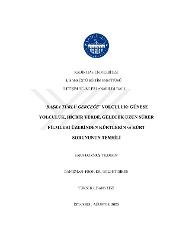| dc.contributor.advisor | Diken, Bülent | en_US |
| dc.contributor.author | Yıldırım, Sara Durmuş | |
| dc.date.accessioned | 2021-07-31T14:59:59Z | |
| dc.date.available | 2021-07-31T14:59:59Z | |
| dc.date.issued | 2020 | |
| dc.identifier.uri | https://hdl.handle.net/20.500.12469/4115 | |
| dc.description.abstract | In this thesis, the impact of journey narrative films which question belonging, identity, and displacement on the representation of Kurds and Kurdish issues in "new political films" were examined. This study aims to claim that representation of Kurds and Kurdish conflicts in the films of "the new cinema" significantly differ from the previous periods when the very same topic has been approached via a single perspective based on stereotypes. All in all, in this new period of cinema in Turkey, the journey narrative is a recurring theme being used to question this former one-sided perspective. In this respect, first, the differences between those two periods separately examined and followed up by the analysis to discuss the origin of the way of thinking and it is effect on the practice of representation. And then, the mode of representation based on a single perspective and stereotype until the new cinema of Turkey is explained. Subsequently, it was discussed that why changing practices of cinematography is called new and how the changes and transformation experienced in the social, political, cultural, economic and sector contributed to the transfer of the Kurdish representation on the screen from such a different perspective. In the last chapter of the thesis, three significant examples of new political films Journey to the Sun (Yeşim Ustaoğlu, 1999), Future Last Forever (Özcan Alper, 2011) and In Nowhere Land (Tayfun Pirselimoğlu, x 2001) were analyzed using the formal analyzed method. As a result of the examination, it was understood that these films are using the journey narratives as an effective tool to question the official ideology and convey the narrative of their stories from a counter perspective. Consequently, it was explained how is journey narrative shapes the structure of the films. Another important outcome of the analyzes was that they differ from the representation practice of previous periods with their filmmaking practices and critical attitudes. | en_US |
| dc.description.abstract | Bu tezde Kürtlerin ve Kürt sorununun aktarıldığı ve "yeni politik filmler" içerisinde değerlendirilecek olan Güneşe Yolculuk (Yeşim Ustaoğlu,1999), Hiçbir Yerde (Tayfun Pirselimoğlu, 2001), Gelecek Uzun Sürer (Özcan Alper, 2011) filmlerinde karşımıza çıkan yolculuk temasının filmlerin anlatılarına nasıl etki ettiği incelenmiştir. Çalışmanın amacı, "yeni Türkiye sineması" olarak adlandırılan dönemde Kürtlerin ve Kürt sorununun temsilinin önceki dönemlerin basmakalıp ve tek perspektiften aktarıldığı anlatım biçimine kıyasla belirgin farklılıklar gösterdiğini ve bu filmler içerisinde karşımıza çıkan yolculuk anlatılarının bu temsil etme biçimini sorgulamak için nasıl etkili bir araç olarak kullanıldığını tartışmaktır. Bu çalışmada öncelikle, değişen temsil pratiği yeni Türkiye sineması ve öncesi olarak ayrı ayrı dönemler içeresinde incelenmiştir ve "yeni" olarak adlandırılan dönem öncesinde temsil pratiğini etkileyen düşünüş biçimlerinin nereden kaynaklı olduğunu tartışan analizlere yer verilmiştir. Yeni Türkiye sinemasına kadar Kürtlerin ve Kürt sorununun nasıl tek taraflı ve basmakalıp düşünceler ile aktarıla geldiği açıklanmıştır. Ardından, değişen sinema yapma pratiğinin neden "yeni" olarak adlandırıldığı tartışılmış ve sosyal, kültürel, politik ve sektör içerisinde yaşanan değişim ve dönüşümlerin Kürtlerin sinema perdesindeki temsilinin nasıl bu kadar farklı bir perspektiften aktarabilmesine katkı sağladığı açıklanmaya çalışılmıştır. Son bölümde ise, "yeni politik filmler" içerisinde Kürtlerin ve Kürt sorunun viii temsili konusunda belirgin örnekler olan Güneşe Yolculuk (Yeşim Ustaoğlu,1999), Hiçbir Yerde (Tayfun Pirselimoğlu, 2001), Gelecek Uzun Sürer (Özcan Alper, 2011) filmlerinin ayrıntılı analizi yapılmıştır. Yapılan inceleme sonucu bu filmlerin ele aldıkları konuların, sorgulayıcı üslup ve tutumlarının bu filmleri nasıl önceki dönemlerin sinema yapma pratiğinden ayırdığı açıklanmıştır. Bu filmlerin, yolculuk anlatısını nasıl resmî ideolojinin tek taraflı aktarımlarının sorgulanmasının aracısı yaptığı ve bu temanın filmlerinin yapısını nasıl şekillendirdiği irdelenmiştir | en_US] |
| dc.language.iso | tur | en_US |
| dc.publisher | Kadir Has Üniversitesi | en_US |
| dc.rights | info:eu-repo/semantics/openAccess | en_US |
| dc.subject | N/A | en_US |
| dc.title | Başka Türlü Gerçeğe" yolculuk: Güneşe yolculuk, hiçbir yerde, gelecek uzun sürer filmleri üzerinden Kürtlerin ve Kürt sorununun temsili | en_US |
| dc.title.alternative | Journey to a "different kind of truth": representation of kurds and kurdish issue through journey to the sun, future last forever, in nowhere land examples | en_US |
| dc.type | masterThesis | en_US |
| dc.department | Enstitüler, Lisansüstü Eğitim Enstitüsü, Radyo, Televizyon ve Sinema Ana Bilim Dalı | en_US |
| dc.institutionauthor | Yıldırım, Sara Durmuş | en_US |
| dc.relation.publicationcategory | Tez | en_US |
| dc.identifier.yoktezid | 671048 | en_US |
















